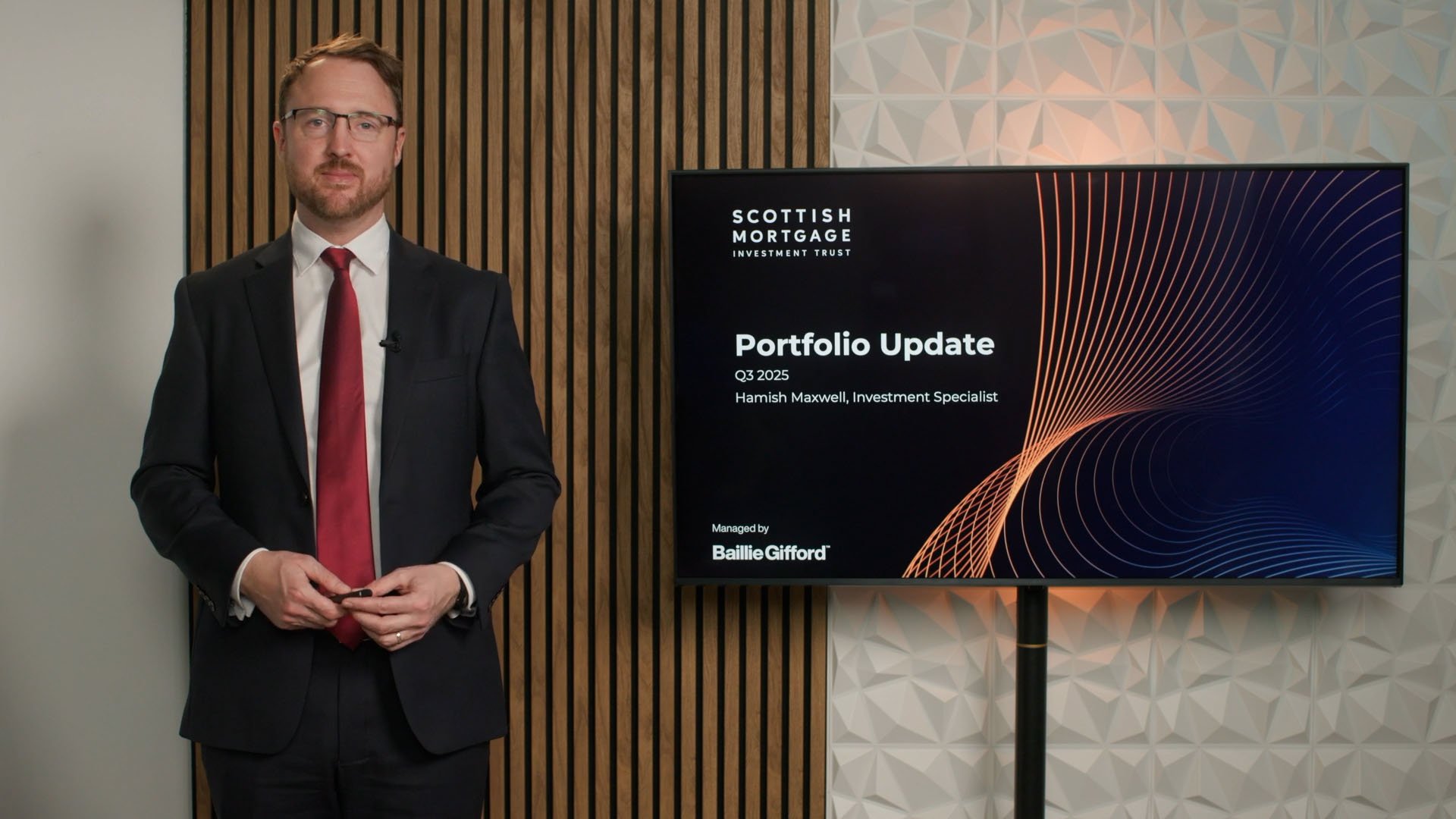The Age of Resilience: Outperformers Must First be Survivors
Tom Slater
- In the era of peak uncertainty, Scottish Mortgage seeks companies tough enough to withstand shocks
- The likes of Meta, Shopify and Ferrari have financial strength and can innovate in changing markets
- The Trust still dares to pursue exceptional growth, but wants greater certainty about its portfolio companies’ adaptability
Illustrations by Mark Smith
As with any investment, your capital is at risk.
In 1921, Frank Knight, the Chicago School economist, defined the crucial difference between risk and uncertainty.
Risk – something that can be quantified and insured against – had always been the stuff of traditional economic modelling. But to Knight, it was uncertainty, meaning what no expert or analyst can ever measure, that rules the real world.
In our era, it’s manifest in pandemics, natural disasters, financial stresses, trade wars and real wars, all bouncing off each other in chaotic, unforeseeable ways.
His point was that uncertainty, “the inherent, absolute unpredictability of things”, creates opportunities for entrepreneurs. They are rewarded (along with their investors) for bearing the weight of the unknowable rather than for taking mere calculated risks.
It seems to Scottish Mortgage that we’re at a peak of ‘Knightian uncertainty’ right now, as geopolitical posturing heats up the global economy’s complex adaptive system. You can theorise about President Trump’s long-term objectives, but the truth is we don’t know the potential outcomes, and we certainly don’t know what probabilities to assign to them.

Getting comfortable with uncertainty
For me, having an edge as an investor comes from taking a different view from the market of a company’s potential, what the upside could be and what might happen if we’re right. We aim to see the value in an opportunity before others. That means getting comfortable with uncertainty. If a company faces predictable and quantifiable risks, the market will already agree on its value.
Our experience over the last few years has led us to think more deeply about the different characteristics of exceptional growth. The difficult period the Trust endured in the rising interest rate environment of 2022 – following an unusually long expansion – hasn’t changed our process. But it’s made us look harder at whether companies are resilient enough to adapt to whatever’s thrown at them.
Our willingness to back a company’s blue-sky vision is unchanged. But we’re more aware that it’s the business you’re running today, not the one you might have tomorrow, that must deal with problems along the way.

However great the opportunity, if a company can’t overcome inevitable bumps in the road, it won’t live to fulfil its potential. It’s about maximising chances.
A case in point from our portfolio is Northvolt, the Swedish battery maker that filed for bankruptcy in November last year. We shared founder Peter Carlsson’s vision of a European champion in a world increasingly turning to electric vehicles.
Our mistake was not foreseeing its vulnerability to weaker-than-forecast customer demand and operational problems that delayed its ramping up of capacity.
Anatomy of a resilient company
What does resilience look like? In practical terms, specific financial characteristics count. The questions we ask of companies are:
- does it have debt or not?
- does it have big enough margins to absorb the ebb and flow of sales?
- does it generate cash?
However, there are wider cultural questions, often related to their being founder-led businesses. I’ve written before in Trust about how founders can make counterintuitive decisions and get an organisation to buy into change in a way that’s hard for professional managers. Our resilience checklist also asks of management:
- are they nimble and adaptable?
- do they rely on things continuing to be the way they’ve always been?
- do they innovate?
- are they competing in an industry or creating an industry?
Adaptability was vital in the high interest rate environment following the pandemic. Businesses needed to improve profitability to stay flexible. As it turned out, many were much more resilient than superficial financial metrics had suggested, and they’ve subsequently become much more profitable.
Shopify, the ecommerce sales platform, is a good example. Previously, it ran just below break-even and invested in many new projects. Now, it’s still investing and growing rapidly, but it’s switched to a model that manages to keep about 20 per cent of its revenue after covering operating costs. That extra cushion gives it the flexibility to adapt to new developments.

Meta, parent of Facebook and Instagram, is another. It had a ‘year of efficiency’ and addressed some of the weaker parts of its business and cost base. That puts it in a much better position to benefit from an improved operating environment.
Then there’s Cloudflare, the platform that protects and boosts online services. Previously making a small loss, its margins have climbed steadily over the past few years, helping it withstand whatever shocks are thrown at it.
Companies that make their own weather
Resilience means having options and the ability to make your own weather in challenging times. Ferrari needs to be sensitive to customer demand, but its brand power gives it many levers to pull to keep growing.
Oddity, the online makeup business, is thriving in a sector that’s been shrinking. It’s bringing something fresh to the market by enhancing ingredients with newly discovered molecules and using AI to personalise customer recommendations.
These companies show how you can still navigate a trickier environment with sufficient innovation. Because Netflix can add content that people love, it has flexibility around pricing. And it can choose the rate at which it commissions content.
Meituan, the local services and delivery business in China, exemplifies a different sort of resilience. Rivals such as ByteDance and JD.com have been attacking its core delivery markets. Because that had an impact on growth rates and margins, analysts reduced their ratings of the company.
The fact that it has fought off well-funded competition shows the strength and resilience of its business model. It bounced back in its financial metrics and in how the market assesses it. It’s an example of how an investor can outperform: seeing that a business’s resilience is worth more than others think.
I realise that this new emphasis could be read as Scottish Mortgage becoming more timid and risk-averse. Not so. We’re still searching great businesses whose future is uncertain but which can be wildly more successful than anybody else believes.
But the companies that hurt performance in recent years were often those whose vulnerability to changing circumstances ended their chance of fulfilling their potential. When the next crisis comes around, we want to be sure we don’t have too many such companies in our portfolio. It’s about increasing the odds of success by choosing which pools you fish in.
Amid turbulence, focus on what you can predict
I should add that there’s been no shortage of tough environments since I started investing in 2000. But you don’t survive for a quarter of a century in this industry without a degree of detachment and, yes, resilience.
You can work hard and do what you think is a good job, but things come out of left field, and you can do absolutely nothing about them. It’s not a career for everyone, especially now, as increased Knightian uncertainty causes markets to move short-term in crazy ways.
The economist Adam Tooze uses the term ‘polycrisis’ to describe how the economy’s underpinnings are under attack from all angles. The traditional order, he suggests, is breaking down as problems bubble up unpredictably. That’s the reality we must accept. There’s always something to worry about.
For us, it’s about focusing more on what we can predict. If we’re backing companies doing new things, in new ways, with uncertain outcomes, we need them to align with themes we are confident about. For example: we know AI will be more capable five years from now.
We know batteries in electric vehicles will be cheaper and have a greater range. We know cloud and data management software will become more powerful.
In an uncertain world, our job is to refine our understanding of how such long-run developments might play out, aware that only the most resilient will survive to thrive.
About the author - Tom Slater
Tom has been the Manager of Scottish Mortgage since 2015, having been appointed as Deputy Manager in 2009. He joined Baillie Gifford in 2000 and became a Partner of the firm in 2012. Besides Scottish Mortgage, he is the Head of the US Equities Team and a member of another long-term growth equity strategy. During his time at Baillie Gifford, Tom has also worked in the Developed Asia and UK Equity teams. His investment interest is focused on high-growth companies both in listed equity markets and as an investor in private companies. He graduated with a BSc in Computer Science with Mathematics from the University of Edinburgh in 2000.
Regulatory Information
This content was produced and approved at the time stated and may not have been updated subsequently. It represents views held at the time of production and may not reflect current thinking. Read our Legal and regulatory information for further details.
A Key Information Document is available by visiting our Documents page. Any images used in this content are for illustrative purposes only.
This content does not constitute, and is not subject to the protections afforded to, independent research. Baillie Gifford and its staff may have dealt in the investments concerned. The views expressed are not statements of fact and should not be considered as advice or a recommendation to buy, sell or hold a particular investment.
Baillie Gifford & Co and Baillie Gifford & Co Limited are authorised and regulated by the Financial Conduct Authority (FCA). The investment trusts managed by Baillie Gifford & Co Limited are listed on the London Stock Exchange and are not authorised or regulated by the FCA.
Baillie Gifford Asia (Hong Kong) Limited 柏基亞洲(香港)有限公司 (BGA) holds a Type 1 licence from the Securities and Futures Commission of Hong Kong to market and distribute Baillie Gifford’s range of collective investment schemes and closed-ended funds such as investment trusts to professional investors in Hong Kong.
Baillie Gifford Asia (Singapore) Private Limited (BGAS) is regulated by the Monetary Authority of Singapore as a holder of a capital markets services licence to conduct fund management activities for institutional investors and accredited investors in Singapore. BGA and BGAS are wholly owned subsidiaries of Baillie Gifford Overseas Limited, which is wholly owned by Baillie Gifford & Co.
Europe
Scottish Mortgage Investment Trust PLC (the “Company”) is an alternative investment fund for the purpose of Directive 2011/61/EU (the “AIFM Directive”). Baillie Gifford & Co Limited is the alternative investment fund manager (“AIFM”) of the Company and has been authorised for marketing to Professional Investors in this jurisdiction.
This content is made available by Baillie Gifford Investment Management (Europe) Limited (“BGE”), which has been engaged by the AIFM to carry out promotional activities relating to the Company. BGE is authorised by the Central Bank of Ireland as an AIFM under the AIFM Regulations and as a UCITS management company under the UCITS Regulation. BGE also has regulatory permissions to perform promotional, advisory and Individual Portfolio Management activities. BGE has passported its authorisations under the mechanisms set out in the AIFM Directive.
Belgium
The Company has not been and will not be registered with the Belgian Financial Services and Markets Authority (Autoriteit voor Financiële Diensten en Markten / Autorité des services et marchés financiers) (the FSMA) as a public foreign alternative collective investment scheme under Article 259 of the Belgian Law of 19 April 2014 on alternative collective investment institutions and their managers (the Law of 19 April 2014). The shares in the Company will be marketed in Belgium to professional investors within the meaning the Law of 19 April 2014 only. Any offering material relating to the offering has not been, and will not be, approved by the FSMA pursuant to the Belgian laws and regulations applicable to the public offering of securities. Accordingly, this offering as well as any documents and materials relating to the offering may not be advertised, offered or distributed in any other way, directly or indirectly, to any other person located and/or resident in Belgium other than to professional investors within the meaning the Law of 19 April 2014 and in circumstances which do not constitute an offer to the public pursuant to the Law of 19 April 2014. The shares offered by the Company shall not, whether directly or indirectly, be marketed, offered, sold, transferred or delivered in Belgium to any individual or legal entity other than to professional investors within the meaning the Law of 19 April 2014 or than to investors having a minimum investment of at least EUR 250,000 per investor.
Germany
The Trust has not offered or placed and will not offer or place or sell, directly or indirectly, units/shares to retail investors or semi-professional investors in Germany, i.e. investors which do not qualify as professional investors as defined in sec. 1 (19) no. 32 German Investment Code (Kapitalanlagegesetzbuch – KAGB) and has not distributed and will not distribute or cause to be distributed to such retail or semi-professional investor in Germany, this document or any other offering material relating to the units/shares of the Trust and that such offers, placements, sales and distributions have been and will be made in Germany only to professional investors within the meaning of sec. 1 (19) no. 32 German Investment Code (Kapitalanlagegesetzbuch – KAGB).
Luxembourg
Units/shares/interests of the Trust may only be offered or sold in the Grand Duchy of Luxembourg (Luxembourg) to professional investors within the meaning of Luxembourg act by the act of 12 July 2013 on alternative investment fund managers (the AIFM Act). This document does not constitute an offer, an invitation or a solicitation for any investment or subscription for the units/shares/interests of the Trust by retail investors in Luxembourg. Any person who is in possession of this document is hereby notified that no action has or will be taken that would allow a direct or indirect offering or placement of the units/shares/interests of the Trust to retail investors in Luxembourg.
Switzerland
The Trust has not been approved by the Swiss Financial Market Supervisory Authority (“FINMA”) for offering to non-qualified investors pursuant to Art. 120 para. 1 of the Swiss Federal Act on Collective Investment Schemes of 23 June 2006, as amended (“CISA”). Accordingly, the interests in the Trust may only be offered or advertised, and this document may only be made available, in Switzerland to qualified investors within the meaning of CISA. Investors in the Trust do not benefit from the specific investor protection provided by CISA and the supervision by the FINMA in connection with the approval for offering.
Singapore
This content has not been registered as a prospectus with the Monetary Authority of Singapore. Accordingly, this content and any other content or material in connection with the offer or sale, or invitation for subscription or purchase, of the Trust may not be circulated or distributed, nor may be offered or sold, or be made the subject of an invitation for subscription or purchase, whether directly or indirectly, to persons in Singapore other than (i) to an institutional investor (as defined in Section 4A of the Securities and Futures Act 2001, as modified or amended from time to time (SFA)) pursuant to Section 274 of the SFA, (ii) to a relevant person (as defined in Section 275(2) of the SFA) pursuant to Section 275(1), or any person pursuant to Section 275(1A), and in accordance with the conditions specified in Section 275 of the SFA, or (iii) otherwise pursuant to, and in accordance with the conditions of, any other applicable provision of the SFA.
Where the Trust is subscribed or purchased under Section 275 by a relevant person which is:
(a) a corporation (which is not an accredited investor (as defined in Section 4A of the SFA)) the sole business of which is to hold investments and the entire share capital of which is owned by one or more individuals, each of whom is an accredited investor; or
(b) a trust (where the trustee is not an accredited investor) whose sole purpose is to hold investments and each beneficiary of the trust is an individual who is an accredited investor, securities or securities-based derivatives contracts (each term as defined in Section 2(1) of the SFA) of that corporation or the beneficiaries’ rights and interest (howsoever described) in that trust shall not be transferred within six months after that corporation or that trust has acquired the securities pursuant to an offer made under Section 275 except:
(1) to an institutional investor or to a relevant person or to any person arising from an offer referred to in Section 275(1A) or Section 276(4)(c)(ii) of the SFA,
(2) where no consideration is or will be given for the transfer;
(3) where the transfer is by operation of law; or
(4) pursuant to Section 276(7) of the SFA or Regulation 37A of the Securities and Futures (Offers of Investments) (Securities and Securities-based Derivatives Contracts) Regulations 2018.







